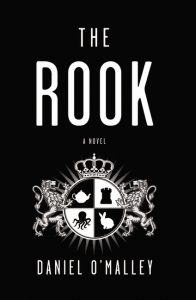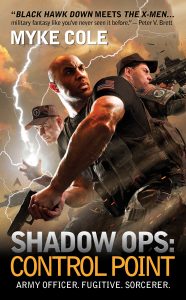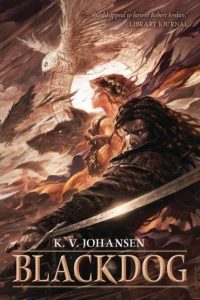Once she was Adrienne Satti, an orphan with a rags-to-riches story.
Now she is Widdershins, a thief with a sharp blade, a sharper wit, and help from a secret god living in her head.
But now something horrid, something dark, is reaching out for her, a past that refuses to let her go …
This is another book that was on my “books to look for in 2012” list. (It’s also on the list of books Lou Anders convinced me to buy with alarming ease. The guy’s a freaking hypnotist.) Before I start the review, I want to share a note about the cover. The image in this post and the cover on my book are different in one way that is significant to me: the apostrophe on my book is a curly quote, not a straight one. I can no longer tell if straight quotes bother me for true aesthetic reasons or because I’ve been trained to eradicate them, but they stab my soul one way or another. However, my scanner is rubbish, and all the online images I can find have the erroneous straight quote, so do me a favor and imagine the cover is typographically flawless, because the final product is.
Now I’ll review the actual text.
Renaissance Romp
This book has several things going for it. The plot races forward at a steady clip, seamlessly shifting from one plot arc to another. Although this is a YA book, Widdershins tackles adult issues—keeping food in her belly, balancing an investment portfolio, etc.—but she still keeps a youthful attitude and likeability. The book’s topics aren’t watered down for a younger audience either. For a novel labeled dark fantasy it’s on the light and friendly side of things, but it still fits comfortably in that sub-genre. The book also benefits from a fresher milieu than many secondary world fantasies: it is neither fully modern nor fully medieval, but takes root in a renaissance-style city called Davillon.
Although dark things happen in the book, it never stops being fun. Between Widdershins and Olgun, her personal god, nearly every page is filled with an element of sarcastic joy, despite the fact that at any given moment just about everything is going wrong. The characters make for good company, no matter the circumstances, which is not something I can say for every book I’ve read.
Some Quibbles
As with most books I review, I have a few quibbles. With Thief’s Covenant, most of them are on the prose level. Sometimes the humorous prose is overwrought, straining too hard for the laugh. Even so, there were plenty of times when it hit the sweet spot and I did laugh, and humor is more subjective than most things, so for some of you the jokes I find overwrought will hit you right on the funny bone.
There are also some more grammar- and usage-related issues: some rule-breaking that doesn’t seem to serve a purpose other than confusing me; some words (like miasma) that appear more frequently than they should (in my opinion); and some sentences I had to read multiple times to follow the action of a scene.
The good news: none of these issues stopped me from enjoying the story. It was fun, fast, and flavorful. I’ll be holding onto my copy, and the sequel, False Covenant, will most likely find its way onto my bookshelf. All minor quibbles aside, I can’t keep away from an upbeat character like Widdershins.
Cover illustration by Jason Chan.










